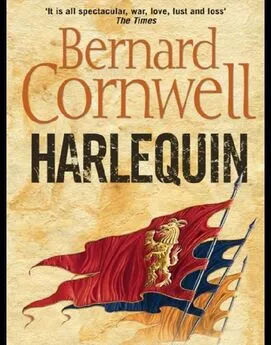Bernard Cornwell - The Grail Quest 2 - Vagabond
- Название:The Grail Quest 2 - Vagabond
- Автор:
- Жанр:
- Издательство:неизвестно
- Год:неизвестен
- ISBN:нет данных
- Рейтинг:
- Избранное:Добавить в избранное
-
Отзывы:
-
Ваша оценка:
Bernard Cornwell - The Grail Quest 2 - Vagabond краткое содержание
In Harlequin, Thomas of Hookton travelled to France as an archer and there discovered a shadowy destiny, which linked him to a family of heretical French lords who sought Christendom′s greatest relic.
Having survived the battle of Crécy, Thomas is sent back to England, charged with finding the Holy Grail. But Thomas is an archer and when a chance comes to fight against an army invading northern England he jumps at it. Plunged into the carnage of Neville′s Cross, he is oblivious to other enemies who want to destroy him. He discovers too late that he is not the only person pursuing the grail, and that his rivals will do anything to thwart him.
After hunting and wounding him, Thomas′s enemies turn him into a fugitive. Fleeing England, he travels to Normandy, determined to rescue Will Skeat, his old commander from Harlequin. Finally Thomas leads his enemies back to Brittany, where he goes to discover an old love and where his pursuers at last trap their reluctant pilgrim.
Vagabond is a vivid and realistic portrait of England at a time when the archer was king of Europe′s battlefields.
The Grail Quest 2 - Vagabond - читать онлайн бесплатно ознакомительный отрывок
Интервал:
Закладка:
'Because he ain't got men to spare,' Totesham said, 'which is no reason for us not to ask.'
Totesham took them inside his house where a fire blazed in a big hearth and his servants brought jugs of mulled wine and plates of bread and cold pork. A baby lay in a wooden cradle by the fire and Totesham blushed when he admitted it was his. 'Newly married,' he told Skeat, then ordered a maid to take the baby away before it began crying. He flinched when Skeat took off his hat to reveal his scarred, thick-ridged scalp, then he insisted on hearing Will's story, and when it was told he thanked Sir Guillaume for the help the Frenchman had given his friend. Thomas and Robbie got a cooler welcome, the latter because he was Scottish and the former because Totesham remembered Thomas from the previous year. 'You were a bloody nuisance,' Totesham said bluntly, 'you and the Countess of Armorica.'
'Is she here?' Thomas asked.
'She came back, aye.' Totesham sounded guarded. 'We can go back to her house, Will,'
Thomas said to Skeat.
'No you can't,' Totesham said firmly. 'She lost the house. It was sold to pay her debts and she's been screaming about it ever since, but it was sold fair and square. And the lawyer who bought it has paid us a quittance to be left in peace and I don't want him disturbed, so the two of you can find yourself space at the Two Foxes. Then come and have supper.' This invitation was to Will Skeat and to Sir Guillaume and pointedly not to Thomas or Robbie. Thomas did not mind. He and Robbie found a room to share in the tavern called the Two Foxes and after-wards, as Robbie had his first taste of Breton ale, Thomas went to St Renan's church, which \vas one of the smallest in La Roche-Derrien, but also one of the wealthiest because Jeanette's father had endowed it. He had built a bell tower and paid to have fine pictures painted on its walls, though by the time Thomas reached St Renan's it was too dark to see the Saviour walking on Galilee's water or the souls tumbling down to their fiery hell. The only light in the church came from some candles burning on the altar where a silver reliquary held St Renan's tongue, but Thomas knew there was another treasure beneath the altar, something almost as rare as a saint's silent tongue, and he wanted to consult it. It was a book, a gift from Jeanette's father, and Thomas had been astonished to find it there, not just because the book had survived the fall of the town – though in truth not many soldiers would seek books for plunder – but because there was any book in a small church in a Breton town. Books were rare and that was St Renan's treasure: a bible. Most of the New Testament was miss-ing, evidently because some soldiers had taken those pages to use in the latrines, but all of the Old Testament remained. Thomas threaded his way through the black-dressed old ladies who knelt and prayed in the nave and he found the book beneath the altar and blew off the dust and cobwebs, then put it beside the candles. One of the women hissed that he was being impious, but Thomas ignored her.
He turned the stiff pages, sometimes stopping to admire a painted capital. There was a bible in St Peter's church in Dorchester and his father had possessed one, and Thomas must have seen a dozen in Oxford, but he had seen few others and, as he searched the pages, he marvelled at the time it must take to copy such a vast book. More women protested his annexation of the altar and so. to placate them, he went a few steps away and sat cross-legged with the heavy book on his lap. He was now too far from the candles and found it hard to read the script, which was mostly ill done. The capitals were pretty, suggesting they had been done by a skilled hand, but most of the writing was cramped and his task was made no easier by his ignorance of where to look in the huge book. He began at the end of the Old Testa-ment. but did not find what he wanted and so he leafed back. the huge pages crackling as he turned them. He knew what he sought was not in the Psalms so he turned those pages fast, then slowed again, seeking words out of the illwritten script and then, suddenly, the names jumped from the page. 'Neemias Athersatha filius Achelai', 'Nehemiah the Governor, son of Hachaliah'. He read the whole passage, but did not find what he sought, and so he leafed still further back, page by stiff page, knowing he was close, and there, at last, it was.
'Ego enim Bram pincerna regis.'
He stared at the phrase, then read it aloud. ' “ Ego enim Bram pincerna regis.” '
'For I was the King's cupbearer.'
Mordecai had thought Father Ralph's book was a plea to God to make the Grail true, but Thomas did not agree. His father did not want to be the cupbearer. No, the notebook was a way of confessing and of hiding the truth. His father had left a trail for him to follow. Go from Hachaliah to the Tirshatha and realize that the Governor was also the cupbearer: ego enim eram pincerna regis. 'Was', Thomas thought. Did that mean his father had lost the Grail? It was more likely that he knew Thomas would only read the book after his death. But Thomas was certain of one thing: the words confirmed that the Grail did exist and his father had been its reluctant keeper. I was the King's cupbearer; let this cup pass from me; the cup makes me drunk. The cup existed and Thomas felt a shiver go though his body. He stared at the candles on the altar and his eyes blurred with tears. Eleanor had been right. The Grail existed and it was waiting to be found and to put the world right and to bring God to man and man to God and peace on earth. It existed. It was the Grail.
'My father,' a woman said, 'gave that book to the church.'
'I know he did,' Thomas said, then he closed the bible and he turned to look at Jeanette and he was almost frightened to see her in case she was less beautiful than he remembered, or perhaps he feared the sight of her would engender hatred because she had abandoned him, but instead he felt tears in his eyes when he saw her face. 'Merle,' he said softly, using her nickname. It meant Blackbird.
'Thomas.' Her voice was toneless, then she flicked her head towards an old woman dressed and veiled in black. 'Madame Verlon,' Jeanette said, 'who is nervous of life, told me that an English soldier was stealing the bible.'
'So you came to fight the soldier?' Thomas asked. A candle guttered to his right, its flame flickering as fast as a small bird's heart.
Jeanette shrugged. 'The priest here is a coward and would not challenge an English archer, so who else would come?'
'Madame Verlon can rest safe,' Thomas said as he put the bible back under the altar.
'She also said' – Jeanette's voice had a quaver in it – 'that the man stealing the bible had a big black bow.' Which was why, she implied, she had come herself instead of sending for help. She had guessed it was Thomas.
'At least you did not have to come far,' Thomas said, gesturing to the side door which led into the yard of Jeanette's father's house. He was pretending not to know that she had lost the house.
Her head jerked back. 'I do not live there,' she said curtly, 'not now.'
A dozen women were listening and they stepped nervously back as Thomas came towards them. 'Then perhaps, madame,' he said to Jeanette, 'you will let me escort you home?'
She nodded abruptly. Her eyes seemed very bright and big in the candlelight. She was thinner, Thomas thought, or perhaps that was the darkness in the church shadowing her cheeks. She had a bonnet tied under her chin and a great black cloak that swept on the flagstones as she followed him to the western door. 'You remember Belas?' she asked him.
'I remember the name,' Thomas said. 'Wasn't he a lawyer?'
'He is a lawyer,' Jeanette said, 'and a thing of bile, a creature of slime, a cheat. What was that English word you taught me? A tosspot. He is a tosspot. When I came home he had bought the house, claiming it was sold to pay my debts. But he had bought the debts!
He promised to look after my business, waited till I was gone, then took my house. And now I am back he won't let me pay what I owed. He says it is paid. I said I would buy the house from him for more than he paid, but he just laughs at me.'
Thomas held the door for her. Rain was spitting in the street. 'You don't want the house,' he told her, 'not if Charles of Blois comes back. You should be gone by then.'
'You're still telling me what to do, Thomas?' she asked and then, as if to soften the harshness of her words, she took his arm. Or perhaps she put her hand through his elbow because the street was steep and slippery. 'I will stay here, I think.'
'If you hadn't escaped from him,' Thomas said, 'Charles was going to marry you to one of his men-at-arms. If he finds you here he'll do that. Or worse.'
'He already has my child. He has already raped me. What more can he do? No' – she clutched Thomas's arm fiercely – 'I shall stay in my little house by the south gate and when he rides into the town I will sink a crossbow quarrel in his belly.'
'I'm surprised you haven't put a quarrel into Belas's belly.'
'You think I would hang for a lawyer's death?' Jeanette asked and gave a short, hard laugh. 'No, I shall save my death for the life of Charles of Blois and all Brittany and France will know he was killed by a woman.'
'Unless he returns your child?'
'He won't!' she said fiercely. 'He answered no appeals.' She meant, Thomas was sure, that the Prince of Wales, maybe the King as well, had written to Charles of Blois, but the appeals had achieved nothing, and why should they? England was Charles's most bitter enemy. 'It's all about land, Thomas,' she said wearily, 'land and money.' She meant that her son, who at three years old was the Count of Armorica, was the rightful heir to great swathes of western Brittany that were presently under English occupation. If the child were to give fealty to Duke Jean, who was Edward of England's candidate to rule Brittany, then the claim of Charles of Blois to sovereignty of the duchy would be seriously weakened and so Charles had taken the child and would keep him till he was of an age to swear fealty.
'Where is Charles?' Thomas asked. It was one of the ironies of Jeanette's life that her son had been named after his great-uncle in an attempt to win his favour.
'He is in the Tower of Roncelets,' Jeanette said, 'which is south of Rennes. He is being raised by the Lord of Roncelets.' She turned on Thomas. 'It's almost a year since I've seen him!'
'The Tower of Roncelets,' Thomas said, 'it's a castle?' 'I've not seen it. A tower, I suppose. Yes, a castle.' 'You're sure he's there?'
'I'm sure of nothing,' Jeanette said wearily, 'but I received a letter which said Charles was there and I have no reason to doubt it.'
'Who wrote the letter?'
'I don't know. It was not signed.' She walked in silence for a few paces, her hand warm on his arm. 'It was Belas,' she said finally. 'I don't know that for sure, but it must be. He was goading me, tormenting me. It is not enough that he has my house and Charles of Blois has my child, Belas wants me to suffer. Or else he wants me to go to Roncelets knowing that I would be given back to Charles of Blois. I'm sure it was Belas. He hates me.'
'Why?'
'Why do you think?' she asked scornfully. 'I have something he wants, something all men want, but I won't give it to him.'
They walked on through dark streets. Singing sounded from some taverns, and somewhere a woman screamed at her man. A dog barked and was silenced. The rain pattered on thatch, dripped from the eaves and made the muddy street slippery. A red glow slowly appeared ahead, growing as they came closer until Thomas saw the flames of two braziers 'varming the guards on the south gate and he remembered how he and Jake and Sam had opened that gate to let in the English army. 'I promised you once,' he said to Jeanette,
Читать дальшеИнтервал:
Закладка:





![Робин Хобб - Странствия Шута [Fool’s Quest]](/books/1086209/robin-hobb-stranstviya-shuta-fool-s-quest.webp)

